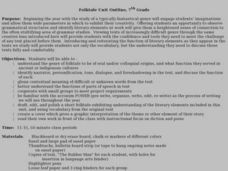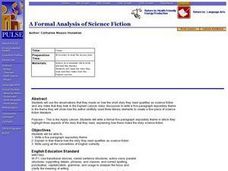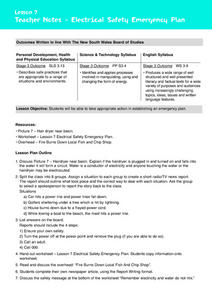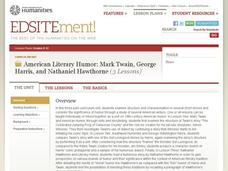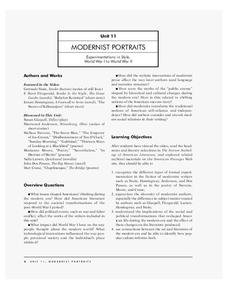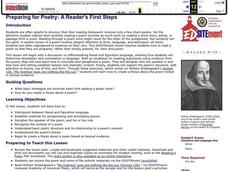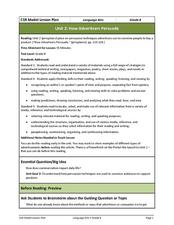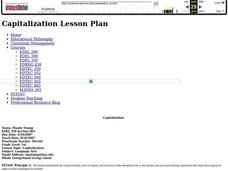Curated OER
Alice's Adventures in Wonderland and Through the Looking-Glass Questions
In this reading comprehension worksheet, students respond to 9 short answer and essay questions based on Lewis Carroll's Alice’s Adventures Through the Looking Glass.
Curated OER
The Crucible
Twelfth graders use an Internet scavenger hunt, vocabulary, sample essay questions, and short answer questions suitable for study and review of the play, The Crucible.
Curated OER
Folktale Unit Outline
Seventh graders analyze grammatical structures and identify literary elements in a variety of texts. Through the genre of folktales, ancient or indigenous cultures are studied.
Curated OER
Phonics lesson for -ar
First graders identify words associated with the -ar sound. They read sentences and compose a story that include words with the -ar sound. The assessment portion of lesson involves students in spelling words with the
-ar pattern.
Curated OER
Phonics lesson for "sh"
First graders identify words with the "sh" pattern. They participate in phonemic awareness, decoding, blending, spelling patterns, and dictation exercises. As the assessment portion of the instructional activity, they may write a story...
Curated OER
Vocabulary Test for The Perilous Road
In this vocabulary words worksheet, students match words to their definitions from the story The Perilous Road. Students complete 28 problems total.
Perkins School for the Blind
Beach Ball with Bell
Encourage your learners who are blind or visually impaired to participate in sports or recreational activities. This super simple idea uses a beach ball with a bell on it to help kids become comfortable with playing catch. The activity...
Curated OER
A Formal Analysis of Science Fiction
Students write a five paragraph expository theme. They explain in their theme how the story they read qualifies as science fiction. Students write using all the conventions of English correctly.
Curated OER
"Raise the Red Lantern" by Su Tong
Pupils read and analyze the novella, "Raise the Red Lantern," by Su Tong. They compare/contrast the story with other works of literature, answer discussion questions, conduct research, and in small groups develop oral presentations.
Curated OER
Electrical Safety Emergency Plan
Students discuss Picture 7 which is a hairdryer near a basin. They discover that if the hairdryer is plugged in and turned on and falls into the water it will form a circuit and anyone touching the water or hairdryer may be electrocuted....
Curated OER
Clay Animations
Students create short animated films using clay figures, digital video cameras, and the computer program iMovie. In this instructional activity, students work cooperatively in small groups to maximize success.
Annenberg Foundation
Social Realism
Many American writers in the late nineteenth century wanted their writing to reflect real life. Individuals watch and discuss a video, read and explore author biographies, write a journal entry and a poem, and complete a multimedia...
National Endowment for the Humanities
American Literary Humor: Mark Twain, George Harris, and Nathaniel Hawthorne
Nathaniel Hawthorne as a humorist? Really? The three lessons in this series focus on the the storytelling style, conventions, and literary techniques employed by Hawthorne, George Washington Harris, and Mark Twain.
Annenberg Foundation
Modernist Portraits
How did literature reflect people's attitudes in post-World War I America? A lesson explores the topic using a variety of activities. Individuals watch and respond to a video; read author biographies and engage in discussion; write...
British Counsil
Sport
From traditional sports like football and basketball to more unique or extreme sports like windsurfing, caving, or bungee jumping, your youngsters will surely get a thorough introduction to the world of sports with this lesson plan!
Channel Islands Film
Lone Woman of San Nicolas Island: Lesson Plan 2
After watching West of the West's documentary The Lone Woman of San Nicolas Island, class members imagine how Juana Maria/Karana may have felt about living alone on the island for 18 years and craft a blackout poem or a narrative in...
Curated OER
Knowledge or Instinct? Jack London's "To Build a Fire"
Young scholars examine the relationship of man and nature in "To Build a Fire" and discuss the juxtaposition of knowledge and instinct. They investigate third person, omniscient point of view.
Curated OER
Preparing for Poetry: A Reader's First Steps
Students examine denotation and connotation in language, and paraphrase a poem. They read and analyze a sonnet by iam Shakespeare, analyze the attitude and tone, paraphrase a poem, and create a thesis about a poem based on textual evidence.
Curated OER
Poetry Project
Choosing a poet or a theme, eighth graders conduct research in the world of poetry. They conduct Internet research and select five poems that fit their poet or theme, and create a seven slide PowerPoint presentation on their selected...
Curated OER
How Advertisers Persuade
This plan centers around the article "How Advertisers Persuade," although it is not included in the lesson itself. Get your class thinking about advertising, appeals, and techniques that companies use to get their products from the shelf...
Curated OER
Capitalization
Teach your class the rules of capitalization with this fun, engaging lesson. Children participate in a learning activity, collaborate with peers, and practice their writing as they learn three specific rules: to always capitalize the...
Houghton Mifflin Harcourt
Problem Solvers: Challenge Activities (Theme 4)
Creative activities help bring literature alive. The first of a set of lessons designed to accompany selections from Theme 4: Problem Solvers uses activities such as skits, responses to music, and social studies projects. These...
Curated OER
Voice and James Joyce
After reading a text written by James Joyce, middle and high schoolers find examples of passive voice. They share their findings with the class. Use this lesson to emphasize the effect of passive voice in writing.
Curated OER
Baseball Statistics
Students read "Casey at the Bat" and then use individual player statistics (found through internet research)to determine if their players could be considered baseball "heroes". They must justify their choices for "hero" by creating...




